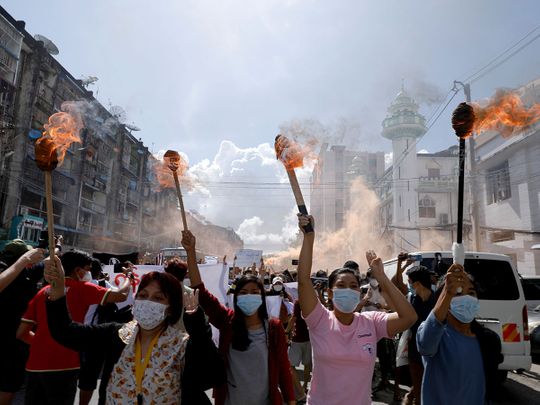
Feb. 1 marked the third anniversary of the current military takeover in Myanmar. Previously, known as Burma, the country has remained under direct military rule since March 1962, when General Ne Win took over, except for National League for Democracy government of Aung San Suu Kyi during 2015 and 2021.
Myanmar however plunged into a state of crises after the 2021 military takeover, which triggered mass protests and a civil disobedience movement. Nearly 4,500 civilians have been killed and 20,000 held in prison according to the estimates from Assistance Association for Political Prisoners (AAPP), which has been monitoring the situation.
In addition to the ongoing insurgency in various parts of the country, Myanmar’s military now faces a serious threat from a coalition of three ethnic militant groups called Three Brotherhood Alliance (3BHA). The three are the Myanmar National Democratic Alliance Army (MNDAA), the Arakan Army (AA) and the Ta’ang National Liberation Army (TNLA).
Not disputed by the military
Late October they launched a coordinated military operation against the military and claim to have seized 422 bases and seven towns from Myanmar’s army since its operations began. The 3BHA also claims to have taken control of Laukkai, a key northern town bordering China. The claims are not disputed by the military.
As a consequence of this operation more than 578,000 people have been displaced on top of 2 million already displaced from previous operations, according to the United Nations.
Sensing the opportunity the National Unity Government (NUG) in exile, comprising of the parliamentarians ousted by the military, issued a 10-point document early in January stating that it is ready to work with China.
The Chinese reportedly have three concerns — that there were cybercrimes syndicates operating in Kokang on Myanmar side of the border targeting Chinese nationals. In fact, during a three-day visit to Myanmar earlier in the month the China’s Vice-Foreign Minister Sun Weidong met Senior General Min Aung Hlaing to discuss border stability.
Secondly, because of fighting the Chinese were concerned about the refugee influx and thirdly, they were worried about its impact on trade and infrastructure development. At the core of concern is the 793Km Myanmar -China gas pipeline, starting in Kyaukpyu city in Myanmar’s Rikhane state and ending in China’s Yunnan province, which began operations in 2013.
The Myanmar military has proved its resilience over the years and yet the odds are getting stacked against its rule. The world should not be surprised if the military starts loosening its grip before it becomes too late.
Sajjad Ashraf served as an adjunct professor at the Lee Kuan Yew School of Public Policy, National University of Singapore from 2009 to 2017. He was a member of Pakistan Foreign Service from 1973 to 2008 and served as ambassador to several countries.








